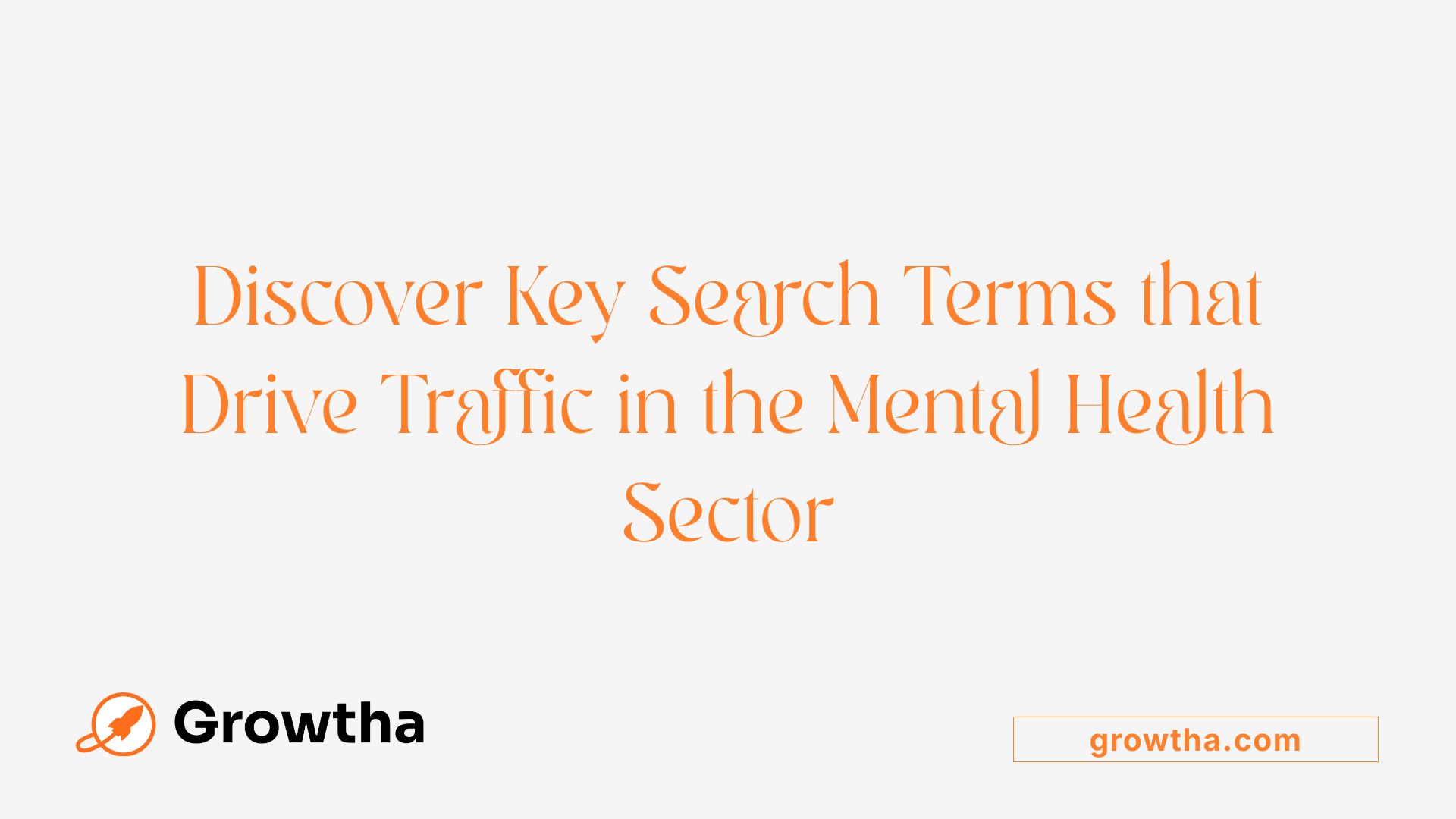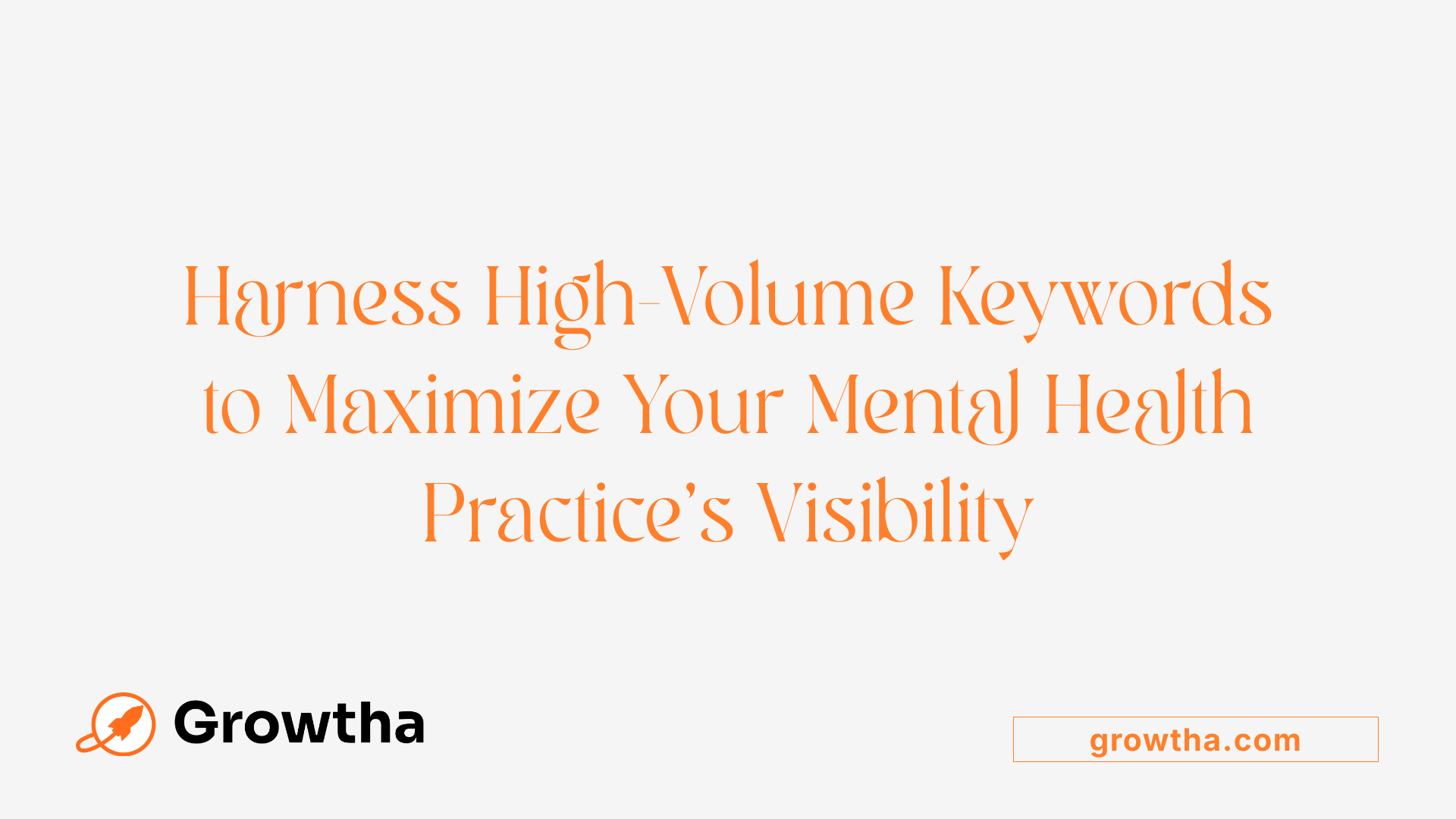Top SEO Keywords for Mental Health Professionals
Unlocking the Power of SEO: Essential Keywords for Mental Health Success


Top SEO Keywords for Mental Health Professionals
Understanding the Vital Role of SEO in Mental Health Practice Growth
In today’s digital landscape, effective search engine optimization (SEO) is crucial for mental health professionals aiming to expand their reach and attract new clients. Identifying and targeting the right keywords can significantly boost online visibility, helping practitioners connect with individuals seeking mental health services. This comprehensive guide explores top SEO keywords, strategies for keyword research, and best practices for content creation to optimize your mental health practice’s online presence.
Overview of Popular SEO Keywords in the Mental Health Sector
 Understanding the most searched keywords in the mental health niche is essential for professionals aiming to optimize their online presence. The broad and highly competitive nature of this area means it's vital to target high-volume terms that connect people with the help they need.
Understanding the most searched keywords in the mental health niche is essential for professionals aiming to optimize their online presence. The broad and highly competitive nature of this area means it's vital to target high-volume terms that connect people with the help they need.
High-volume mental health keywords include general terms such as "mental health," which garners approximately 673,000 searches monthly, and specific conditions like "schizophrenia" and "bipolar disorder," each with over 1 million searches. These keywords reflect widespread public interest and are vital for building visibility.
Condition-specific terms such as "depression" and "anxiety" garner over 1.2 million searches each, indicating significant demand for information about these common issues. Other popular conditions include "burnout," "emotional regulation," and emerging interests like "High-Functioning Anxiety" and "EMDR Therapy."
Location-based keywords help mental health providers attract local clients. Phrases like "psychologist near me," "psychiatrists near me," and "mental health services" are among the most searched, often with hundreds of thousands of searches per month. Including location-specific keywords in your content and profiles enhances local SEO and helps connect potential clients to nearby options.
Informational search terms often use questions or phrases such as "signs of depression" or "what is autism spectrum disorder." These words are part of the upper-funnel searches, where individuals seek basic understanding before considering treatment options. Targeting these helps generate awareness and early engagement.
To maximize SEO effectiveness, mental health professionals should focus on a balanced mix of these keywords, considering search volume, relevance, and competition level. Using tools like Google Keyword Planner and analyzing competitors can help identify opportunities. Incorporating long-tail keywords and adjusting strategies for local versus global reach ensures tailored outreach for different patient segments.
| Keyword Type | Examples | Typical Search Volume | Purpose in SEO Strategy |
|---|---|---|---|
| High-volume general | "mental health," "anxiety," "depression" | 673,000+ for "mental health" | Build broad visibility |
| Condition-specific | "bipolar disorder," "schizophrenia" | 1 million+ | Capture targeted interests |
| Location-based | "psychologist near me," "mental health services" | 246,000+ | Increase local patient flow |
| Informational | "signs of depression," "what is autism" | 16,500+ | Educate and attract early-stage searchers |
Balancing these keywords across your website and digital platforms ensures better reach at each stage of the patient journey—from initial awareness to decision-making. As societal trends evolve, staying updated on popular searches like "Online Therapy" and "Distress Tolerance Skills" can further improve engagement and help mental health providers connect those in need with the appropriate services.
The Significance of High-Volume Keywords and Search Trends

What are some commonly searched keywords related to mental health?
Among the most searched terms globally are words like "mental health," "anxiety," "depression," and "schizophrenia," each featuring extremely high search volumes—often exceeding a million searches monthly. For example, "schizophrenia" garners about 1.5 million searches, while "depression" and "anxiety" each attract approximately 1.22 million searches monthly.
People frequently look for local mental health providers using phrases such as "psychologist near me," which sees around 246,000 searches, and "psychiatrists near me," with about 450,000 monthly searches. These queries highlight a strong interest in accessible, localized mental health support.
In addition to general terms, individuals seek information on specific conditions like "bipolar disorder" with 1 million searches, and "clinical depression," reflecting their concern and need for understanding and treatment. Other popular keywords include "mental health therapy," "signs of depression," and "family therapy near me," with search volumes ranging roughly from 16,500 to 49,500.
Overall, these high-volume keywords reveal a broad and persistent public interest in mental health topics, emphasizing the importance for professionals to align their content and SEO strategies accordingly. By targeting both general and specific search terms, mental health providers can better connect with those seeking help and resources.
How do emerging search trends influence content focus?
Recent trends reveal growing interest in topics like "emotional regulation" and "nature therapy," which are increasingly being searched as individuals explore diverse mental health support strategies beyond traditional therapy. Searches for "High-Functioning Anxiety" and "Online Therapy" reflect societal shifts toward flexible and accessible mental health care options.
In particular, words like "Distress Tolerance Skills" and "Journaling for Mental Health" underscore an emphasis on practical self-help tools that people use to manage their mental well-being. These emerging keywords suggest a move toward holistic and skill-based approaches, aligning content development with user interests.
Understanding such search trends allows mental health professionals and content creators to tailor their offerings, including blog posts, videos, and resources, making them more relevant and engaging.
Impact of search data on content focus
Analyzing the volume and frequency of mental health-related searches helps define what topics are most in demand. High-volume keywords serve as indicators of public interests, guiding content strategies to improve visibility through SEO.
Focusing on popular conditions like "depression," "anxiety," and "schizophrenia," along with emerging areas like "emotional regulation" and "nature therapy," ensures that content remains current and relevant. Using these insights, providers can develop targeted content for different stages of the patient journey—informational content for upper-funnel searches, comparison guides for mid-funnel considerations, and location-specific keywords for bottom-funnel decisions.
By continuously monitoring search data, mental health professionals can adapt their SEO efforts—optimizing title tags, meta descriptions, and content—to meet evolving public needs. This proactive approach helps bridge the gap between individuals seeking mental health resources and the services available, ultimately fostering better outreach and support.
Incorporating Local and Long-Tail SEO Keywords
Utilizing long-tail and geo-specific keywords is a powerful strategy for mental health professionals looking to improve their online visibility and attract more clients. These keywords are more targeted than broad terms, allowing your practice to reach individuals searching for specific services in their local area.
For example, keywords like "therapist in [city]" or "counseling for [condition] in [city]" are highly effective because they match the exact search intent of potential clients. Such phrases help your website appear in local search results, especially when potential clients are looking for immediate, nearby support.
Integrating these keywords into your website content can be straightforward. You can include them in your page titles, meta descriptions, headers, and naturally within the body of your blog posts and service pages. For instance, if you operate in Atlanta, using phrases like "Child therapy services in Atlanta" or "EMDR therapy for anxiety in Atlanta" can enhance local SEO efforts.
Another strategy involves creating dedicated content focused on specific conditions or services tailored to your geographic area. This could include blog articles about local mental health resources, FAQs about therapy options in your city, or case studies highlighting successful treatment stories.
Here's a quick overview of how to incorporate these keywords:
| Strategy | Implementation | Example | Benefit |
|---|---|---|---|
| Use in website metadata | Incorporate keywords into page titles and descriptions | "Best therapists in Chicago" | Improves ranking for local searches |
| Local service pages | Create dedicated pages for specific locations | "Mental health services in Dallas" | Targets area-specific queries |
| Blog content | Write articles targeting local and specific issues | "Managing depression in New York City" | Attracts local audiences and provides value |
| Google My Business | Optimize your profile with location keywords | Listing as "Counselor in Boston" | Boosts visibility in local map packs |
By combining these tactics, you can better connect with potential clients who are actively searching for mental health services near them. Continuous research using tools like Google Keyword Planner and competitor analysis can help refine your strategy, keeping it aligned with current search trends.
In summary, incorporating targeted local and long-tail keywords is essential for building a strong local presence, reaching the right audience, and ultimately growing your practice through increased online traffic.
Using Keyword Research Tools Effectively
 Effective SEO for mental health practices begins with thorough keyword research. Practitioners can leverage powerful tools like Google Keyword Planner, SEMrush, and Ahrefs to discover what potential clients are searching for online. These platforms provide vital data, including search volume, competition level, and user intent, which help identify the most relevant and achievable keywords.
Effective SEO for mental health practices begins with thorough keyword research. Practitioners can leverage powerful tools like Google Keyword Planner, SEMrush, and Ahrefs to discover what potential clients are searching for online. These platforms provide vital data, including search volume, competition level, and user intent, which help identify the most relevant and achievable keywords.
When analyzing these metrics, it's beneficial to focus on keywords with high search volume but lower competition, such as "therapist near me" or "marriage counseling." These keywords often have a higher chance of ranking well and attracting targeted traffic. Additionally, long-tail keywords like "virtual anxiety therapy for working moms" allow practices to reach niche audiences seeking specific services.
Selecting impactful keywords involves understanding the user’s intent—whether they are seeking general information or ready to book a session. Incorporating chosen keywords naturally into website elements such as titles, headers, meta descriptions, and content increases visibility.
Strategies like local SEO are crucial. Using location-based keywords helps attract nearby clients, while optimizing for mobile ensures accessibility. Gathering positive reviews and monitoring performance with analytics tools provide ongoing insights to refine your keyword strategy.
By aligning your keyword choices with your target audience’s needs and search habits, your practice can improve its online presence and connect more effectively with individuals seeking mental health support.
Creating Content with Targeted Keywords
Developing effective content strategies using mental health keywords is essential for connecting with individuals searching for mental health resources online. One approach is to create a variety of educational materials such as blog posts, videos, and FAQ pages that focus on different aspects of mental health. For example, content on symptoms of depression, signs of anxiety, and overview articles on conditions like autism spectrum disorder can attract broad interest.
It is equally important to tailor content to different stages of the patient journey. Upper-funnel content, like informational blogs on common mental health issues, helps increase awareness. Mid-funnel content could compare treatment options such as outpatient programs versus inpatient care, assisting individuals considering治疗 options. Bottom-funnel content is highly specific and location-based, like neighborhood-specific pages or 'near me' searches for therapists.
Including local and service-specific keywords in your content enhances visibility in geographic areas. For instance, writing about 'psychologists near me' or 'family therapy in [City]' helps attract local clients. Additionally, incorporating long-tail keywords—such as 'EMDR therapy for PTSD in Atlanta'—can help target niche audiences actively seeking specialized services.
Following SEO best practices is crucial. Naturally embedding both general and targeted keywords into your website content, including titles, headers, and meta descriptions, increases search engine rankings. Regularly updating your keyword list based on ongoing research, using tools like Google Keyword Planner or SEMrush, ensures your content remains relevant.
Finally, maintaining a mobile-friendly, fast-loading website and establishing backlinks through guest blogging and social media engagement are indispensable for a successful SEO strategy. When these elements are combined, mental health professionals can effectively connect individuals at every stage of their search, guiding them toward the appropriate care.
Role of Technical SEO and On-Page Optimization
 Site speed, mobile optimization, and URL structures are foundational elements of effective technical SEO for mental health websites. Fast-loading pages enhance user experience and reduce bounce rates, especially given the increasing number of users accessing sites via mobile devices. Clear, descriptive URLs not only improve readability for visitors but also help search engines understand the page content.
Site speed, mobile optimization, and URL structures are foundational elements of effective technical SEO for mental health websites. Fast-loading pages enhance user experience and reduce bounce rates, especially given the increasing number of users accessing sites via mobile devices. Clear, descriptive URLs not only improve readability for visitors but also help search engines understand the page content.
Meta tags, header tags, and schema markup play crucial roles in on-page SEO. Well-crafted meta titles and descriptions should incorporate relevant keywords to improve click-through rates from search results. Header tags organize content for both users and search engines, emphasizing important topics like symptoms or treatment options. Schema markup adds structured data, allowing search engines to display rich snippets such as reviews and service details, which can attract more visitors.
A user-friendly website architecture ensures visitors can easily find the information they seek. Clear navigation menus, logical page hierarchies, and a clean layout help guide users through your site seamlessly. For mental health professionals, having dedicated pages for services, FAQs, contact details, and location-specific information not only improves usability but also boosts local SEO efforts.
Developing content strategies using targeted keywords involves thorough research and segmentation. Professionals should analyze keywords relevant to their services, including high-volume, low-competition terms, and tailor content to match the different stages of a patient’s journey. Creating engaging articles, videos, and resources around symptoms, treatment options, and provider expertise attracts potential clients. Regular updates and ethical accuracy reinforce credibility and help maintain strong search engine rankings. Combining these technical and content strategies maximizes online visibility, connecting individuals with the mental health resources they need.
Building External Authority Through Off-Page SEO Strategies
When it comes to strengthening your mental health practice's online presence, off-page SEO plays a vital role. This involves activities outside your website that help establish credibility, authority, and visibility in search engine rankings.
One of the most effective off-page strategies is link building. Securing backlinks from reputable mental health websites, industry blogs, and online directories signals to search engines that your site is trustworthy and valuable. Guest posting on relevant platforms not only generates backlinks but also positions you as an authority in your field.
Reviews and testimonials are also crucial. Encouraging satisfied clients to leave positive reviews on platforms like Google My Business and health-specific review sites can enhance your reputation and improve local search visibility. Additionally, participating in local directories and engaging with influencer outreach can expand your reach.
Establishing credibility online is about consistent engagement and generating trust. Collaborate with other healthcare professionals, publish high-quality content that addresses common client concerns, and maintain active social media profiles. These efforts combined help your practice appear more trustworthy and accessible to prospective clients.
| Tactic | Details | Benefits |
|---|---|---|
| Link Building | Secure backlinks from reputable sources | Boosts authority and search rankings |
| Guest Posting | Write articles on industry-relevant sites | Builds backlinks and authority |
| Reviews | Gather client testimonials | Improves local SEO and reputation |
| Local Listings | List your practice on directories | Increases local visibility |
| Influencer Outreach | Partner with online influencers | Expands brand awareness |
Resources tailored for mental health practitioners include specialized tools like Google Keyword Planner and Google Search Console for targeted keyword insights. Platforms like Google My Business support local SEO, while technical tools such as GTmetrix and Google PageSpeed Insights optimize website performance. Many SEO service providers, including Sachs Marketing Group and OptiMantra, offer tailored solutions for mental health practices, guiding practitioners on effective off-page strategies.
By leveraging these techniques, mental health professionals can improve their online authority, attract more clients, and ultimately build a successful practice.
Monitoring and Adjusting Your SEO Strategy Over Time
 In the rapidly evolving field of online mental health services, maintaining an effective SEO strategy requires ongoing monitoring and refinement. Utilizing analytics tools such as Google Analytics and Search Console allows therapists and clinics to track how their website performs in terms of traffic, bounce rates, and conversion rates. These insights reveal which keywords and content resonate most with visitors, enabling targeted adjustments.
In the rapidly evolving field of online mental health services, maintaining an effective SEO strategy requires ongoing monitoring and refinement. Utilizing analytics tools such as Google Analytics and Search Console allows therapists and clinics to track how their website performs in terms of traffic, bounce rates, and conversion rates. These insights reveal which keywords and content resonate most with visitors, enabling targeted adjustments.
Adjusting keywords based on emerging trends is essential. For example, as societal concerns shift, keywords like "High-Functioning Anxiety" or "Online Therapy" may become more popular, prompting providers to optimize existing content or create new material around these topics.
Continuous content updates and regular SEO audits are crucial to stay competitive. Refreshing blog posts with recent statistics, adding new resources like videos or e-books, and ensuring technical SEO elements such as site speed and mobile compatibility are optimized can significantly improve search engine rankings.
How does incorporating long-tail and local SEO keywords benefit mental health service marketing? Incorporating long-tail and local SEO keywords significantly enhances mental health service marketing by targeting highly specific search queries that potential clients are actively seeking, thereby attracting qualified traffic. Long-tail keywords, which are longer and more detailed, tend to have lower search volumes but higher conversion rates, as they align closely with users' specific concerns and intentions, such as "Coping strategies for anxiety in young adults" or "Managing relationship conflicts through communication therapy." Using local keywords ensures that services appear prominently in searches within a particular geographic area, increasing visibility to nearby clients seeking immediate assistance. This targeted approach not only boosts online presence but also helps in engaging users who are further along in their decision-making process, leading to higher appointment booking rates. Overall, a strategic implementation of these keywords makes marketing efforts more effective by connecting mental health providers with individuals actively seeking personalized solutions in their locality.
Harnessing SEO to Enhance Your Mental Health Practice
By understanding and implementing a well-rounded SEO strategy that includes high-volume keywords, local and long-tail terms, and continuous optimization, mental health professionals can significantly improve their online visibility. Regularly leveraging keyword research tools, creating targeted content, and maintaining technical SEO best practices ensure that your practice remains competitive in the ever-evolving digital landscape. Building authority through off-page strategies and monitoring performance with analytics tools will help sustain growth and attract more clients. Embracing these SEO practices is essential for mental health practitioners looking to expand their reach, establish credibility, and better serve those seeking mental health support.
References
- Keywords for Mental Health: Google Ads & SEO
- Top Mental Health Keywords | Free SEO Keyword List - KeySearch
- SEO for Therapists: The Ultimate Guide - Talkspace
- Mental & Behavioral Health Keywords: What Consumers Search For
- Mental Health Therapy Keywords: What Are People Looking For?
- Top Mental Health Keywords | Free SEO Keyword List - KeySearch
- What are Some Keywords for Mental Health Professionals?







